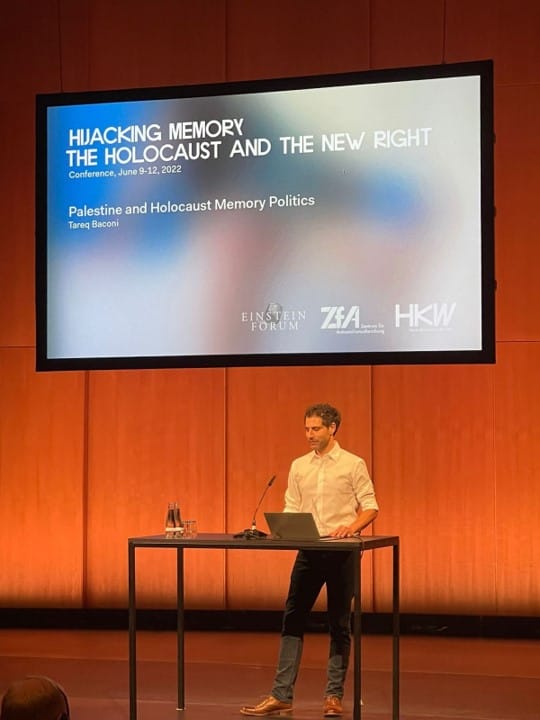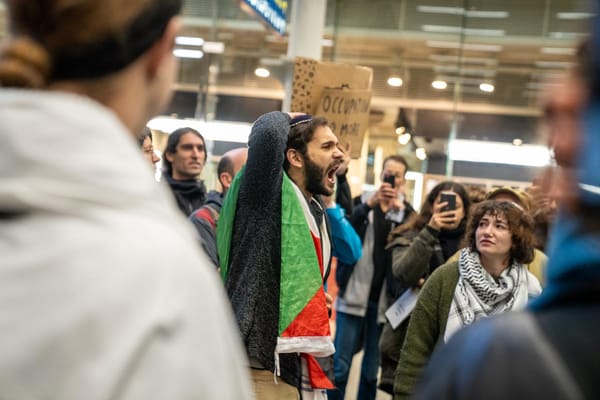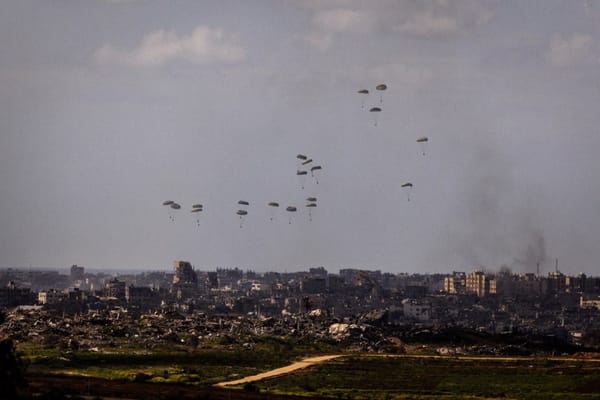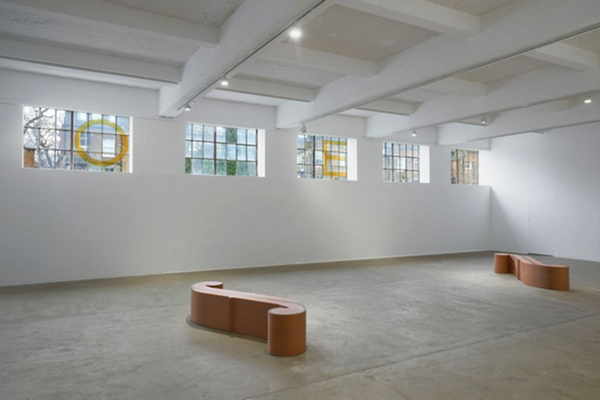Palestinians deserve a say on anti-semitism
Zionism has inextricably linked our oppressions.

I wish the conspiracy theories were true – that George Soros was heading some intergalactic Jewish bund planning universal domination from a sexy volcano cave in Nicaragua. I’m sure the uniforms would be fantastic. The truth is that being a left-wing Jew is a lonely experience.
For those of us not lucky enough to be raised by radicals, becoming a Jewish leftist involves developing a feeling of alienation, even betrayal. We might sit with inchoate discomfort for years – why am I singing Hatikvah in Bergen Belsen? – before we ever articulate it, aware that when we do, we risk incalculable loss: friends, family members, a future we might’ve imagined for ourselves.
Told repeatedly that our politics are not only marginal but dangerous, shunned at J-Soc and shouted down at shabbes dinner, it’s often only when we’re adults that we realise – like yiddishe space cadets – that there are others like us out there, fighting the same solitary fights.
In the UK, spaces in which left-wing Jews can socialise, organise, feed and entertain one another are beginning to proliferate. Yet besides a few notable exceptions, the Jewish left is poorly globally networked. When UK lawmakers crib anti-BDS legislation from their US counterparts, when the same far-right rhetoric inspires synagogue shootings in Halle and in Pittsburgh, the atomisation of the international Jewish left is a major problem. It might not be for long.
Last weekend, Jewish activists, journalists and scholars from around the world – including me and Aron – came to Berlin for ‘Hijacking Memory: The Holocaust and the New Right’. The four-day conference was, as co-organiser Susan Neiman put it, “historic”. Its probing of the abuse of Jewish trauma – in a state that abuses it best – risked public backlash, if not total shutdown. In the end, the event proceeded mostly – though not entirely – without incident. Below I share my main takeaway from the conference, particularly its hairier moments: if we’re not including Palestinians in discussions of anti-semitism, we’re doing it wrong ▼
Rivkah Brown.
Metaphors of erasure
by Rivkah Brown
“Being a Jew in Germany,” said Emily Discher-Becker, opening the conference last Thursday, “is like being in a relationship with someone whose big, dramatic feelings crowd out your own.” I imagine Palestinians feel similarly.
Last month, the German chapter of the pro-Palestine organisation European Jews for a Just Peace petitioned the Berlin police to lift its Naqba Day protest ban – instituted due to the alleged risk of anti-semitic speech or violence – to allow the city, including its 25,000 Palestinian inhabitants, to mourn the assassinated journalist Shireen Abu Akleh. Their request was denied. When some mourners went ahead anyway, the police attacked them. I guess they were overcome with Holocaust guilt.
There is no space within the state-sanctioned memorialisation of the Holocaust for Jews to mourn. We know this well in the UK, where the government is building a massive monument to our ancestors’ deaths despite many of us (on both left and right) saying we don’t want it. Of course, these concrete monstrosities are not for us. They are for the state to polish its antiracist credentials and so continue terrorising Black and brown people with a clear conscience. Even Melanie Phillips – the right-wing Jewish columnist quoted in Anders Breivik’s manifesto – called the planned Westminster memorial “vacuous anti-anti-semitism virtue-signalling”. I find it hard to disagree with her.
The problem is, there isn’t space in Holocaust memory for Palestinians, either. This became horribly clear at the Berlin conference when Tareq Baconi, president of the Palestinian policy network Al-Shabaka, spoke on the third day. In his talk, ‘Palestine and Holocaust Memory Politics’, Baconi argued that Palestinians have become “collateral damage in European imperialism”, specifically via its attempts to atone for the Holocaust through the creation of the state of Israel, “a land without a people for a people without a land”.
Offering a further metaphor of erasure, Baconi said that Palestinians are “a canvas against which Jewish psychodramas play themselves out”. He made his point topographically, citing Yad Vashem, the Israeli Holocaust memorial established in 1953 within sight of Deir Yassin, the Palestinian village where Zionist militias had massacred 106 people just five years earlier (in 2009, Yad Vashem guide Itamar Shapira was fired for mentioning the massacre to a tour group). In no abstract sense, Jewish post-trauma is built atop Palestinian trauma, grinding it into dust.
I don’t imagine Baconi expected to be vindicated so soon after his talk. The next day Polish Jews Jan Grabowski and Konstanty Gebert opened their own contributions to the conference by denouncing Baconi (or more accurately, Baconi’s empty seat: he had left the conference and so could not respond to their criticisms). Despite mischaracterising his arguments, the speakers seemed less concerned about the content of Baconi’s speech than its context: “Mr Baconi is certainly entitled to his opinions,” they said, “which would, however, be more appropriate at a conference on Palestinian activism.” You have your shit, we have ours.
The idea of discrete racial oppressions is a liberal fantasy cooked up to atomise the working class and replace collective resistance with interracial antagonism remediated by toothless “interfaith” work. Yet the specific idea of anti-semitism and anti-Palestinianism as two lines running in parallel through history is particularly fantastical.
The Polish speakers’ suggestion that Baconi get his own damn conference belies the imbrication of Jews and Palestinians by Israel. This is not a situation Palestinians want, by the way: Baconi was clear that if it had been any other group of people that had colonised Palestine, Palestinians would have resisted just the same. No, this toxic entanglement was brought about by Zionists.
The idea of discrete racial oppressions is a liberal fantasy cooked up to atomise the working class and replace collective resistance with interracial antagonism remediated by toothless “interfaith” work.
The Zionist mission is to protect Jewish people from another Holocaust by ethnically homogenising the land between the Jordan River and the Mediterranean Sea, dispossessing, dehumanising and murderously destroying the Palestinian people in the process. This strategy has an inbuilt defence mechanism: the claim that Palestinians who dare to resist their own domination are pursuing not political resistance to the Jewish ethnostate but rather a personal vendetta against Jews themselves; that they would, if given the chance, unleash another Holocaust.
In their denunciation, the Polish speakers suggested that Baconi’s “presence [at the conference] was deemed necessary for reasons of political expediency”. Yet it is Zionist logic, not woke tokenisation, that renders Palestinians stakeholders in discussions of anti-semitism. It is telling that Gebert and Grabowski gave Baconi no chance to defend himself. By excluding Palestinians from the debate, we refuse them the opportunity both to contest the smears against them and, more importantly, to show how such smears are a symptom of anti-Palestinianism, a term whose very novelty testifies to its acceptability.
On the penultimate day of the conference, Haggai Matar, executive director of +972 Magazine – perhaps moved by Baconi’s speech – organised a last-minute group photo in solidarity with Palestinian and anti-apartheid activists facing German state repression (he couldn’t call it a demo, since these must be registered with German police). “Silencing Palestinians is NOT fighting anti-semitism,” Matar said in his invitation to conference attendees. The Polish speakers clearly didn’t get the memo.
Matar’s statement implies its inverse. Listening to Palestinians is obviously insufficient for fighting anti-semitism. Nor should Palestinians be forced to channel discussions of their own oppression into discussions of anti-semitism (Why, asked the Palestinian-American political commentator Yousef Munnayer in the Q&A after Baconi’s talk, is the bar for entry so high in discussions of Palestinian experience? Why must we first prove that we are not anti-semites?). Yet when the entirety of Palestinian life is maligned as anti-semitic – when so much as wearing a keffiyeh will get you arrested in Berlin – excluding Palestinians from conversations about anti-semitism is simply not an option. ▼
Rivkah Brown is the editor-in-chief of Vashti.




